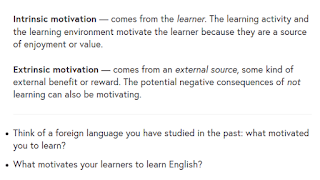Teaching For Success: Learning and Learners Week 1
This week's purpose was to understand our learners, starting by getting to know their motivation. So, according to Carl Roger's theory, there are two types of motivation:
I thought it was a very good idea to include these two questions, because sometimes teachers are detached from their students and their processes, forgetting all about when they were students themselves, and even saying things like "I come here 'only' to teach my class".
Next, it was about rapport. Although teachers are not supposed to intervene in their students' lives, it's important to have a healthy relantionship with them. I sometimes think that schools have come so artificial that are characterised as "special" or "diferent" environments, that they give the impression to be out of reality. When a teacher shouts to their students is not only wrong, but it is not the way one "normally" behaves oneself on any other context (well, hopefully). Moreover, it's going to backfire: it will create hostility towards not only the teacher, but to the other students, and most of all, to the subject that's been taught.
The teacher must be very self-aware. The course recommended these ways to build rapport:
Then we moved on to the speaking activities. I think the steps suggested here can be taken into account in any learning activity:
Finally, students can tell if you're enjoying what you do. So, if you like teaching, and it shows, the students will become engaged.
 |
| I've always thought Carl Rogers is a fine name for a middle aged country singer. |
Next, it was about rapport. Although teachers are not supposed to intervene in their students' lives, it's important to have a healthy relantionship with them. I sometimes think that schools have come so artificial that are characterised as "special" or "diferent" environments, that they give the impression to be out of reality. When a teacher shouts to their students is not only wrong, but it is not the way one "normally" behaves oneself on any other context (well, hopefully). Moreover, it's going to backfire: it will create hostility towards not only the teacher, but to the other students, and most of all, to the subject that's been taught.
The teacher must be very self-aware. The course recommended these ways to build rapport:
- Choose your attitude
- Use names
- Listen
- Avoid over correcting
- Stand tall.
Then we moved on to the speaking activities. I think the steps suggested here can be taken into account in any learning activity:
- Choose the right topic
- Be specific
- Give support and preparation time
- Allow learners to work together
- Provide a clear purpose
It is safe to say that if we do not know our students' interests or motivation, we don't make them feel comfortable through empathy and we don't stablish a respectful and fun environment inside our classroom, it'll be difficult (if not impossible) to make them speak.Also, the teacher has to develop some kind of a "super power" to be able to listen to the students while they're working in groups, specially in large classes. But I have done it, and it's actually fun to see how they want to express their ideas and, if the activity is well set up, they will only need the teacher for specific doubts (such as vocabulary or pronunciation).
Finally, students can tell if you're enjoying what you do. So, if you like teaching, and it shows, the students will become engaged.

Comentarios
Publicar un comentario
Continúe la discusión: